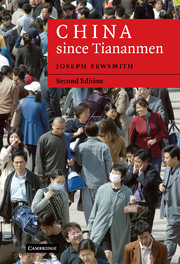Book contents
- Frontmatter
- Contents
- Acknowledgments
- Chronology
- Schematic overview of the Chinese political spectrum
- List of abbreviations and tables
- Introduction
- PART I LINE STRUGGLE REVISITED: THE ATTACK ON DENG'S REFORM PROGRAM
- PART II REDEFINING REFORM: THE SEARCH FOR A NEW WAY
- PART III ELITE POLITICS AND POPULAR NATIONALISM
- PART IV A NEW ERA IN CHINESE POLITICS
- 8 Hu Jintao takes over: a turn to the left?
- Conclusion
- Epilogue: the Seventeenth Party Congress
- Bibliography
- Index
- Cambridge Modern China Series
8 - Hu Jintao takes over: a turn to the left?
Published online by Cambridge University Press: 05 September 2012
- Frontmatter
- Contents
- Acknowledgments
- Chronology
- Schematic overview of the Chinese political spectrum
- List of abbreviations and tables
- Introduction
- PART I LINE STRUGGLE REVISITED: THE ATTACK ON DENG'S REFORM PROGRAM
- PART II REDEFINING REFORM: THE SEARCH FOR A NEW WAY
- PART III ELITE POLITICS AND POPULAR NATIONALISM
- PART IV A NEW ERA IN CHINESE POLITICS
- 8 Hu Jintao takes over: a turn to the left?
- Conclusion
- Epilogue: the Seventeenth Party Congress
- Bibliography
- Index
- Cambridge Modern China Series
Summary
In the Chinese political system, Party congresses provide an occasion for the gathering and analysis of the sort of information that allows the system to take stock of itself. Most of these analyses are internal, and thus are never viewed by the public, but as the Sixteenth Party Congress approached, one such analysis, compiled under the auspices of the Central Organization Department, was published openly. Unfortunately, when the New York Times wrote about the publication, it was quickly withdrawn, shutting down this tentative move in the direction of greater openness. Nevertheless, this publication, which deals with the growing social order problems facing China, provides a vivid picture of Chinese society as seen from the perspective of the organization system.
“Mass disturbances” numbered some 58,000 in 2003, and would rise to 74,000 in 2004 and 87,000 in 2005. Most such incidents – some 70– 80 percent, according to one county in Shandong province, and 90 percent according to a survey in Sichuan – were caused by tensions between cadres and masses, and most of the violence was initiated by cadres. The Organization Department attributed these disturbances largely to growing income inequalities, saying that “if income inequalities cannot be controlled within certain limits, the broad masses of the people will inevitably lose faith in socialism and their faith in the Party will be shaken. It is even possible that reform could be broken off and social chaos [ensue].”
- Type
- Chapter
- Information
- China since TiananmenFrom Deng Xiaoping to Hu Jintao, pp. 231 - 271Publisher: Cambridge University PressPrint publication year: 2008
- 1
- Cited by



